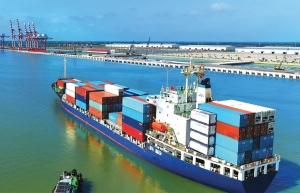Navigating turbulence in logistics and supply chains
 |
| Navigating turbulence in logistics and supply chains, Source: freepik.com |
The current state of domestic growth in logistics reveals a modest improvement in volumes compared to the tumultuous conditions of 2023. However, this increment has not sufficed to fully recuperate the financial wellbeing of the companies still grappling with the repercussions of past economic downturns.
Many logistics firms continue to operate under severe financial strain, with numerous companies enduring tight or negative profit margins. This financial vulnerability places several of these entities on the precipice of potential collapse, underscoring a critical need for robust financial strategies and support.
Moreover, the international logistics landscape has been anything but stable. The sector experienced a spike in import and export freight costs for the majority of the year, only to witness a significant drop recently. This erratic pricing dynamic has introduced additional unpredictability into an already volatile market, complicating fiscal planning for businesses that are reliant on global shipping.
A pivotal factor exacerbating these challenges has been the development trends within the warehouse segment of the industry. During 2022 and 2023, Vietnam saw a surge in investments directed towards new warehouse constructions, spurred by optimistic forecasts regarding the sector’s growth. Unfortunately, these projections did not fully materialise, leading to an oversupply of warehouse space. This overcapacity has been compounded by lower-than-anticipated demand, resulting in numerous underutilised spaces and consequently, a depression in storage pricing. This trend is likely to persist until demand realigns with the current supply, potentially stretching over the next couple of years.
The sector’s vulnerabilities were further tested by the impact of Typhoon Yagi, which severely disrupted operations, particularly in the northern regions of Vietnam. The devastation wrought by Yagi not only interrupted logistics operations but also inflicted severe financial distress upon the already struggling companies. The aftermath of such natural disasters has spotlighted the critical importance of disaster preparedness and resilience in operational planning.
The economic pressures on shippers and logistics companies have not eased, with many facing challenging sales environments and heightened uncertainty due to fluctuating international shipment costs. These conditions have clouded profit forecasts and intensified the financial scrutiny within the sector.
Looking ahead, the market outlook suggests a potential consolidation as smaller, financially weakened companies may succumb to the prevailing economic pressures, paving the way for larger, more resilient companies to expand their market share. This consolidation could stabilise the market to some extent but is also likely to maintain low price levels in the short to medium term due to existing oversupply.
Innovation, a key driver of growth under normal circumstances, is expected to see limited investment as companies prioritise survival and immediate operational concerns over long-term strategic initiatives.
However, the repeated disruptions experienced, including those from natural disasters like Typhoon Yagi, may catalyse an imperative shift towards building greater resilience. This entails not only enhancing infrastructure and diversifying facilities but also refining risk management practices and continuity planning to better withstand crises.
While the logistics and supply chain sector in Vietnam faces daunting challenges in 2024, it also holds potential for transformative growth and development. The adversity faced this year could foster a more robust and efficient industry in the long term as companies are compelled to adapt and innovate in response to these trials.
However, stakeholders should temper their expectations, recognising that the road to recovery may entail significant restructuring and possibly, the failure of some enterprises before stability and growth are achieved.
 | Vietnam SuperPort to elevate supply chain capabilities Vietnam SuperPort, a joint venture between YCH Group (Singapore) and T&T Group (Vietnam), has launched the new vision to enhance the country's logistics capabilities. Yap Kwong Weng, CEO of Vietnam SuperPort spoke to VIR's Nguyen Huong about the launch. |
 | Vietnam must take advantage of green logistics potential Vietnam is facing the challenges of transitioning to green practices, requiring investment, infrastructure improvements, and government support to achieve sustainability and unlock new business opportunities. |
 | Green Logistics is gaining traction to reduce greenhouse gas emissions Chairman and CEO Jareeporn Jarukornsakul of WHA Corporation Public Co., Ltd. delves into green logistics as companies look to slash greenhouse gas emissions and make the sector more sustainable. |
(*)Julien Brun, managing partner, CEL
What the stars mean:
★ Poor ★ ★ Promising ★★★ Good ★★★★ Very good ★★★★★ Exceptional
Related Contents
Latest News
More News
- Vietnam, New Zealand seek level-up in ties (February 19, 2026 | 18:06)
- Untapped potential in relations with Indonesia (February 19, 2026 | 17:56)
- German strengths match Vietnamese aspirations (February 19, 2026 | 17:40)
- Kim Long Motor and AOJ Suzhou enter strategic partnership (February 16, 2026 | 13:27)
- Haiphong welcomes long-term Euro investment (February 16, 2026 | 11:31)
- VIFC in Ho Chi Minh City officially launches (February 12, 2026 | 09:00)
- Norfund invests $4 million in Vietnam plastics recycling (February 11, 2026 | 11:51)
- Marico buys 75 per cent of Vietnam skincare startup Skinetiq (February 10, 2026 | 14:44)
- SCIC general director meets with Oman Investment Authority (February 10, 2026 | 14:14)
- G42 and Vietnamese consortium to build national AI infrastructure (February 09, 2026 | 17:32)

 Tag:
Tag:




















 Mobile Version
Mobile Version